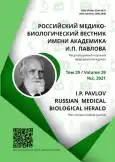Genetic predictors of an unfavorable course of obliterating atherosclerosis of lower limb arteries
- Authors: Kalinin R.E.1, Suchkov I.A.1, Chobanyan A.A.1, Nikiforov A.A.1, Shumskaya E.I.1
-
Affiliations:
- Ryazan State Medical University
- Issue: Vol 29, No 2 (2021)
- Pages: 251-256
- Section: Original study
- URL: https://bakhtiniada.ru/pavlovj/article/view/65383
- DOI: https://doi.org/10.17816/PAVLOVJ65383
- ID: 65383
Cite item
Abstract
AIM: This study aimed to determine the influence of −250G>A polymorphism in the LIPC gene and –1607insG in the MMP-1 gene on the course of obliterating atherosclerosis of lower limb arteries (OALLA).
MATERIALS AND METHODS: Seventy-six individuals were included in this study. In the first group (n = 34), patients with an unfavorable (progressive) course of OALLA and developed critical ischemia of the lower limbs within 5 years from the onset of the disease were included. In the second group (n = 34), patients with a conventionally favorable (non-progressive) course but did not develop critical ischemia of the lower limbs within 5 years from the onset of the disease and did not have a progressive degree of chronic ischemia. In the control group, healthy volunteers (n = 8) without signs of atherosclerosis in all vascular pools were included. In all the patients, LIPC-250G>A and MMP-1-1607insG were genotyped. The difference in the observed and expected frequencies was evaluated via a Pearson χ2 test with correction for likelihood.
RESULTS: Significant differences (p = 0.013) in the −250G>A polymorphism of the LIPC gene were found between the observed and expected frequencies compared with those in patients with OALLA and healthy volunteers. The assessment of the first and second groups revealed differences in the observed and expected frequencies (р = 0.004). Heterozygous carriage (GA genotype) was associated with an increased risk of the development of the unfavorable course of OALLA (hazard ratio = 2.133 with 95% confidence interval = 1.214–3.748). In the analysis of the −1607insG polymorphism of the MMP-1 gene, statistically insignificant data were obtained compared between the first and second groups (р = 0.128) and between the groups of patients with OALLA and healthy volunteers (р = 0.38).
CONCLUSIONS: The heterozygous carrier of LIPC −250G>A was associated with an increased risk of an unfavorable OALLA course. This research on this polymorphism could be applied to patients with the newly diagnosed atherosclerosis of the arteries of the lower extremities to determine the prognosis of the disease course, especially in young patients with early manifestation and individuals with a burdened hereditary history. The −1607insG polymorphism of the MMP-1 gene had no effect on the course of OALLA.
Full Text
##article.viewOnOriginalSite##About the authors
Roman E. Kalinin
Ryazan State Medical University
Email: kalinin-re@yandex.ru
ORCID iD: 0000-0002-0817-9573
MD, Dr.Sci.(Med.), Professor, Head of the Department of Cardiovascular, X-Ray Endovascular, Operative Surgery and Topographic Anatomy
Russian Federation, RyazanIgor A. Suchkov
Ryazan State Medical University
Author for correspondence.
Email: suchkov_med@mail.ru
ORCID iD: 0000-0002-1292-5452
MD, Dr.Sci.(Med.), Professor, Professor of the Department of Cardiovascular, X-Ray Endovascular, Operative Surgery and Topographic Anatomy
Russian Federation, RyazanArtem A. Chobanyan
Ryazan State Medical University
Email: artaleksandrovich@gmail.com
ORCID iD: 0000-0002-8129-5976
PhD-Student of the Department of Cardiovascular, X-ray Endovascular, Operative Surgery and Topographic Anatomy
Russian Federation, RyazanAleksandr A. Nikiforov
Ryazan State Medical University
Email: alnik003@yandex.ru
ORCID iD: 0000-0002-7364-7687
MD, Cand.Sci.(Med.), Head of the Central Research Laboratory
Russian Federation, RyazanEvgenia I. Shumskaya
Ryazan State Medical University
Email: shumsckaya.ev@yandex.ru
Assistant of the Department of Histology, Pathological Anatomy and Medical Genetics
Russian Federation, RyazanReferences
- Kalinin RE, Suchkov IA, Mzhavanadze ND, et al. Comparison of cytotoxicity of vascular prostheses in vitro. I.P. Pavlov Russian Medical Biological Herald. 2020;28(2):183-92. (In Russ). doi: 10.23888/PAVLOVJ2020282183-192
- Dua A, Lee CJ. Epidemiology of Peripheral Arterial Disease and Critical Limb Ischemia. Techniques in Vascular and Interventional Radiology. 2016;19(2):91-5. doi: 10.1053/j.tvir.2016.04.001
- Adam DJ, Bradbury AW. TASC II Document on the Management of Peripheral Arterial Disease. European Journal of Vascular and Endovascular Surgery. 2007;33(1):1-2. doi: 10.1016/j.ejvs.2006.11.008
- Kalinin RE, Egorov AA, Suchkov IA, et al. Effect of genetic polymorphisms on functioning of a permanent vascular access in patients on dialysis. Angiology and Vascular Surgery. 2019;25(1):40-4. (In Russ). doi: 10.33529/angio2019105
- Starodubova YuN, Osipova IV. Characteristics of dyslipidemia and the duration of rheumatoid arthritis in women. Ateroscleroz. 2017;13(3):33-42. (In Russ).
- Vilms EA, Dolgikh TI, Turchaninov DV. The prevalence of polymorphisms of genes, associated with socially significant multifactor diseases of Omsk population. Medical Almanac. 2012;(3):169-72. (In Russ).
- Valdivielso P, Ariza MJ, Vega-Román C, et al. Association of the -250G/A promoter polymorphism of the hepatic lipase gene with the risk of peripheral arterial disease in type 2 diabetic patients. Journal of Diabetes and its Complications. 2008;22(4):273-7. doi: 10.1016/j.jdiacomp.2007.06.011
- Djazaeva МB, Gladkikh NN, Reshetnikov VA, et al. Matrix metalloproteinases: role in cardiac remodeling in patients with connective tissue dysplasia. Medical News of North Caucasus. 2018;13(4):576-80. (In Russ). doi: 10.14300/mnnc.2018.13108
- Kalinin RE, Suchkov IA, Pshennikov AS, et al. Application of Magnesium Drugs and Their Influence on the Indicators of Connective Tissue Dysplasia in Patients with Varicose Veins. Novosti Khirurgii. 2018;26(1):51-9. doi: 10.18484/2305-0047.2018.1.51
- Lin J, Kakkar V, Lu X. Impact of matrix metalloproteinases on atherosclerosis. Current Drug Targets. 2014;15(4): 442-53. doi: 10.2174/1389450115666140211115805
- Ivanoschuk DЕ, Ragino YuI, Shakhtshneider ЕV, et al. Analysis of differential expression of matrix metalloproteases in stable and unstable atherosclerotic lesions by a method of full genome sequencing of RNA: pilot study. Russian Journal of Cardiology. 2018;23(8):52-8. (In Russ). doi: 10.15829/1560-4071-2018-8-52-58
- Natsional’nyye rekomendatsii po diagnostike i lecheniyu zabolevaniy arteriy nizhnikh konechnostey. Moscow; 2019. Available at: http://www.angiolsurgery.org/library/recommendations/2019/recommendations_LLA_2019.pdf. Accessed: 2021 April 26. (In Russ).
- Chahirou Y, Mesfioui A, Ouichou A, et al. Adipokines: mechanisms of metabolic and behavioral disorders. Obesity and Metabolism. 2018;15(3):14-20. (In Russ). doi: 10.14341/OMET9430
- Kalinin RE, Suchkov IA, Chobanyan AA. Prospects for forecasting the course of obliterating atherosclerosis of lower limb arteries. Nauka Molodykh (Eruditio Juvenium). 2019;7(2):274-82. (In Russ). doi: 10.23888/HMJ201972274-282
- Bakker W, Eringa EC, Sipkema P, et al. Endothelial dysfunction and diabetes: roles of hyperglycemia, impaired insulin signaling and obesity. Cell and Tissue Research. 2009;335(1):165-89. doi: 10.1007/s00441-008-0685-6
Supplementary files






